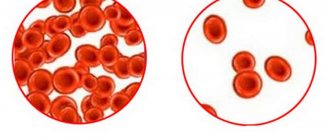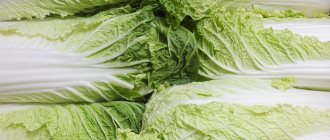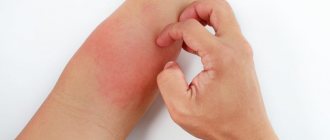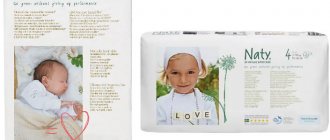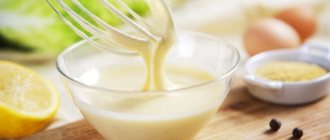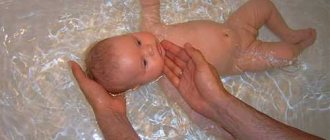Can a nursing mother eat nuts after giving birth?
Nuts are generally quite a strong allergen, so a nursing mother should start eating them with extreme caution. The chemical composition of the product is very rich:
- vitamins E, H, K, PP, group B;
- copper;
- potassium;
- calcium;
- silicon;
- phosphorus;
- iron;
- selenium;
- zinc.
Cashews are very filling and healthy - 100 g of the product contains 600 kcal. This is due to the high content of monounsaturated fats. Thanks to this nutritional composition, the product will allow a woman to restore strength after childbirth, strengthen the immune system, and give the body energy and strength.
Advice
If you ate this nut during pregnancy, then you have a better chance of avoiding allergic manifestations in your child.
Use during pregnancy and lactation
The fruit of the overseas cashew is readily eaten during pregnancy. Throughout the entire period of bearing a child, a woman must follow a special diet in which all components are balanced in quantity and composition, which is important for the health of the unborn baby.
During pregnancy
Expectant mothers benefit from a daily serving of nuts, which can be eaten regardless of the stage of pregnancy. But you should try them with caution the first time. They can help solve the following problems:
- Eliminate micronutrient deficiency in the body. It is especially important to maintain iron levels, which are necessary to increase hemoglobin levels.
- They relieve vitamin deficiencies, which weaken a woman’s body and have a bad effect on the intrauterine development of the fetus.
- Reduce the risk of developing dystrophy in the newborn and pathologies of the cardiovascular system.
- Keep teeth in good condition thanks to the high content of calcium and magnesium in the composition.
- Helps avoid heartburn, which is possible due to disruptions in the gastrointestinal tract.
- Stabilizes blood pressure, improving the overall well-being of the expectant mother.
During pregnancy and pregnancy, apart from possible intolerance to the product, there are no other contraindications. You just need to think about when and how much to eat cashew nuts, and create the right menu so as not to cause problems with the digestive system.

During lactation
During breastfeeding, cashew provides complete nutrition to the baby, saturating the baby’s body with the components necessary for growth and development. Tropical nuts help with breastfeeding:
- Increase the immunity of mother and child, reducing the risk of infectious diseases.
- Strengthen the baby's skeletal system.
- Form the baby’s digestive system due to the presence of fiber and protein.
Cashews help provide the baby with high-quality and nutritious nutrition during breastfeeding. “Milk rivers” absorb components from the mother’s diet, so breastfeeding is preferable.
Attention!
If an allergic reaction to an exotic fruit does not appear immediately, it may develop with long-term consumption of nuts during pregnancy. In this case, you should stop taking them and consult your doctor for help.
Is it possible to eat during breastfeeding in the first month?
You should not eat cashew nuts immediately in the first month after giving birth. His intestines are still very weak, nuts through breast milk can cause regurgitation, diarrhea or rashes. According to the recommendation of pediatricians, nuts can be introduced into the mother’s diet when the baby is 3 months old. But this needs to be done gradually.
Eat one nut first and observe your baby's reaction throughout the day. If he does not have any unpleasant sensations: redness, colic, intestinal problems, then increase the intake of cashews to 5 pieces per day.
There is no need to eat more than 6-8 kernels per day, as they make the milk thick and it will be harder for a small child to breastfeed.
Start of reception
Cashews can be consumed during breastfeeding, starting from the third month of the baby’s life. In the first month (preferably the first two months) after giving birth, you need to go on a diet, because the children's gastrointestinal tract is not fully formed and is sensitive to all foods eaten by the mother.
Cashews are considered the most hypoallergenic among all types of nuts, but they should also be introduced into the diet with caution. To ensure that a new product does not cause stomach upset or allergies in a child, it must be consumed wisely. So, for the first time you need to eat one nut and monitor the child’s health for 24 hours. If the child’s body reacts normally, you can increase the daily dose of cashew nuts, but it should not exceed 8 pieces per day.

Cashews are considered an almost hypoallergenic product, but they should be introduced into the diet of a nursing mother with caution.
Beneficial properties and harm of nuts for women during breastfeeding
For mother

Nut benefits:
- helps the body regain strength after the birth of a child;
- strengthens the immune system;
- improves the condition of skin, hair and nails;
- increases the level of hemoglobin, and therefore iron, in the blood;
- improves the quality of breast milk;
- normalizes metabolism in the body.
A nut can only be harmful if you eat too much of it. In case of overeating, since this product contains a lot of fat, there may be problems with the gastrointestinal system or extra pounds will be added.
Article on the topic
Useful properties and contraindications of cashews for women.
For a child
The baby will also receive all the vitamins and nutrients contained in nuts through breast milk.
Attention!
But cashews should be introduced into the diet of a nursing mother no earlier than the baby is 3 months old.
Benefits of nuts:
- the nutritional value and fat content of breast milk increases;
- the growth and development of the child improves;
- immunity is strengthened;
- his body receives useful minerals and vitamins.
Harm:
- allergic manifestations: rash, redness;
- bloating and regurgitation.
If undesirable symptoms appear in a child, cashew consumption should be stopped.
Beneficial features
Cashews contain a large amount of vitamins and minerals that have a beneficial effect on the development and growth of an infant. The useful composition will help a woman recover faster after childbirth. The calorie content of nuts is less than 600 kcal per 100 grams; if the dosage is observed, a nursing mother should not be afraid of gaining excess weight. Cashews have a beneficial effect both on the body as a whole and on individual organs. This variety of nuts performs a number of important functions:
- Reduces the level of harmful cholesterol in the blood;
- Ensures normal material metabolism;
- Strengthens the immune system and prevents the development of diseases, viruses and infections, protects the body from dangerous bacteria;
- Stimulates brain activity;
- Participates in the formation of bone tissue;
- Strengthens teeth and gums;
- Normalizes the functioning of the kidneys and heart;
- Helps with anemia, heart and vascular diseases;
- Improves mood and relieves fatigue, helps with depression;
- Normalizes sleep;
- Prevents the appearance and development of cancerous tumors.
In addition, cashews are good for smokers, as they reduce nicotine levels in the blood. Nuts of this variety are recommended for use during severe physical activity, depressed mood and magnesium deficiency. Cashews have undoubted benefits for women, as they are responsible for reproductive function and facilitate menstruation.
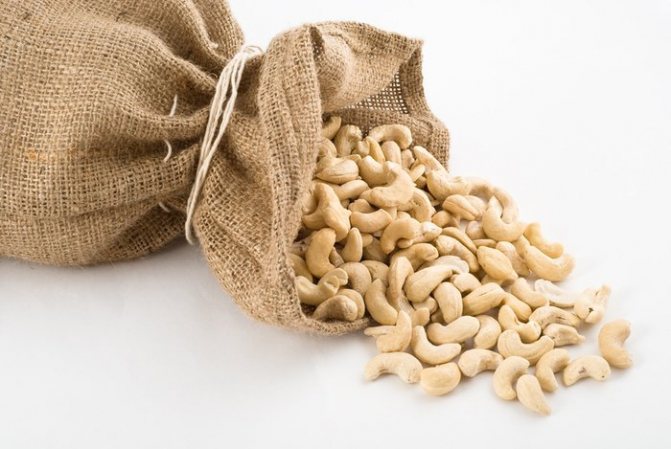
Contraindications

- acute forms of gastritis;
- enterocolitis;
- cholelithiasis;
- individual intolerance;
- stomach and duodenal ulcers;
- various dermatitis.
Important!
Overweight women should limit themselves to a few kernels, as the nut is very high in calories.
Cashews for nursing mothers
These nuts are low allergenic compared to other varieties. Therefore, nursing mothers can include them in their diet. Why deny yourself such a delicacy if there are no serious contraindications? But you shouldn’t completely exclude the possibility of allergic reactions.
You need to start eating cashews during lactation, like all other foods, carefully and with very small doses. It is advisable to wait with this innovation at least until the child is 2 months old. Then try including 1-2 nuts a day in your diet. If this does not affect the baby in any way, the portion can be increased slightly. The recommended daily dosage is 30 g or 6-8 cashews. You should not exceed it. During breastfeeding, rationality and moderation in nutrition are important.
There is an opinion that cashews increase the amount of milk during breastfeeding. But there is no scientific evidence for this theory. But definitely, milk will become more nutritious and will be replenished with important vitamins and microelements.
Overweight women, which is not uncommon after childbirth, are often afraid to eat high-calorie foods such as nuts. But in fact, there is no need to exclude these unique gifts of nature; it is enough to limit their use to the recommended dosages. It’s better to cut calories from other foods.
How to choose the right nut?
You should choose only good quality nuts, without any bitter taste. The kernels must be free of chips and cracks, dry, free of oil stains, mold and plaque. Cashews are always sold peeled, as their shells contain harmful substances and acids. It is cleaned manually by specially trained people. Therefore, when choosing nuts, you need to look carefully so that there are no traces of oil deposits on them.
At home, nuts are stored in the refrigerator for up to six months, in the dark, in a tightly closed container. This way they do not spoil and retain all their beneficial properties.
Precautions before use

- It is better to eat the product raw, without any impurities: salt, sugar, other seasonings;
- Under no circumstances should you eat bitter, moldy or expired nuts;
- Monitor your child’s well-being: if he or she develops a rash, redness or any other allergy symptoms, stop taking the product immediately;
- do not eat more nuts than the daily allowance - this is 8-10 nuts per day, even if the baby feels well.
Only by following all the rules can you not be afraid of a negative reaction from the child’s body.
Why are cashew nuts dangerous during lactation?
Like many products, nuts have a number of contraindications for consumption. And cashews are no exception here. It was noted that this type of nut is less likely to cause an allergic reaction than others. In this regard, only walnuts and pine nuts are safer. But still this possibility remains. Moreover, allergies can occur not only in the baby, but also in the mother. There are cases when it is the mother who cannot eat cashews, suffering from allergies, but the child is quite capable of eating them calmly when he can already feed himself.
Allergic reactions can be dangerous to human health and life. Skin rashes, redness, and itching are only mild symptoms. If you ignore them and continue to eat nuts, this can lead to the development of more serious complications in the form of swelling of the respiratory tract, which is already life-threatening. Therefore, it is worth closely monitoring the reaction to the introduction of cashews into the diet. If the mother or baby feels discomfort within 1-3 days, they have a skin rash or an upset stomach, it is worth postponing its administration for another month. There is no need to give up the product completely either. After 1–2 months, the baby’s digestive system is able to become so strong that it will no longer react so sharply to the presence of this product in the diet.
Also contraindications to consuming cashews are serious problems with the kidneys and liver. This is especially true for those who have a tendency to form stones. Fatty nuts can cause the movement of stones, which is accompanied by painful sensations and deterioration in general well-being. During lactation, the female body already experiences a lot of stress, so there is no need to aggravate the situation. This may lead to the need for urgent drug treatment, which is undesirable when the mother is breastfeeding her baby.
Nuts can also provoke rapid and uncontrolled weight gain in both mother and child. Of course, this problem arises when the consumption rate of a product is greatly exceeded. Those who are prone to obesity should limit themselves and not eat more nuts than prescribed.
It has already been noted that the presence of nuts in the diet of a nursing mother changes the structure of milk, increases its fat content and nutritional value. But this process can also have negative consequences. The milk becomes thicker, which impairs its outflow. It is more difficult for the baby to suckle at the breast. Also, breast milk that is too fatty and nutritious can cause diarrhea or constipation in the baby.
Before you decide to include cashews in your diet, you should make sure there are no allergies or other contraindications. If problems arise, it is better to postpone its introduction into food or eliminate it altogether if the situation repeats itself every time the nuts are eaten. It is also worth consulting with your doctor.
How and when to introduce it into the mother's diet for the first time?
During lactation, it is very important to introduce new foods not immediately, but gradually. If your baby develops an allergy, you will immediately understand which product caused it. First introduce 1-2 nuts into your diet, raw, without any additives.
If you are overweight, eat cashews before meals, and vice versa, if you want to gain some weight, then combine your meals with nuts.
Advice
Cashews are recommended to be eaten raw, because heat treatment destroys many of the beneficial properties of the product.
Cashews during breastfeeding: benefits and rules of use
Cashew nuts are a natural product that contains many useful components that are so necessary for a woman who has just given birth to restore the body. At the same time, nuts are a strong allergen; they can bring many sleepless nights to young parents. So is it possible to eat these nuts while breastfeeding? Let's figure it out.
Cashew nuts will be very useful for both a nursing mother and her baby.
Can a mother eat cashews while breastfeeding?
Cashew nuts are average in the nut family in terms of allergenicity. According to pediatricians, walnuts and pine nuts are considered safer when breastfeeding.
If you ate cashew nuts during pregnancy, then during breastfeeding you have a better chance of avoiding allergies in your baby than those mothers who did not eat cashews during pregnancy.
In any case, it makes sense to try to introduce these nuts into your diet since they contain a huge amount of useful substances that are so necessary for the full development of the baby.
Is it possible to eat cashews in the first month after giving birth?
In the first month after birth, eating nuts is not recommended since the newborn’s gastrointestinal tract is still weak and their consumption will most likely cause severe colic or a rash.
However, if you still want to introduce cashews into your diet in the first month after the baby is born, then do it carefully. On the first day in the morning, eat 1 piece and carefully monitor the child’s well-being. If the day went well, then gradually increase your daily cashew intake to 5 pieces. per day (in the first month).
Pediatricians say that nursing mothers should introduce cashew nuts into their diet no earlier than the baby is 3 months old.
Although cashews contain many beneficial vitamins and minerals, do not eat too many nuts at once. This can negatively affect the condition of the baby.
Also, a large number of these nuts leads to excessive thickness of breast milk and it will be difficult for the baby to suckle.
How to introduce nuts into your diet?
During lactation, it is very important to introduce new products gradually, no more than 1 product every 2 days. This is done so that it is possible to determine what the baby has an allergic reaction to and postpone the introduction of this product for another month. Nuts are no exception.
It is best to eat them raw. Heat treatment will destroy most of the beneficial substances of the nut.
Cashews contribute to a feeling of fullness, so if you are overweight, then it is better to eat nuts before meals, and if, on the contrary, you would like to gain a little weight, then eat nuts after meals or between meals.
Nut consumption rate
The recommended consumption rate is 8 nuts per day, but not more than 40g. It is in this quantity that nuts will have the greatest positive effect on the composition of a nursing mother’s milk.
And you shouldn’t be afraid for your figure. Cashews are perhaps the only nut that will not make you fat.
Precautions when breastfeeding
Here are the basic rules, following which you will most likely prevent a reaction in the form of a rash and colic in a baby:
- Carefully monitor the condition of your child's skin. The allergen can accumulate in the body for up to 2 weeks. Even 2 weeks after starting to take the product, your baby may develop a very noticeable rash. In this case, stop eating cashews immediately and try them again in at least a month.
- Even if your baby tolerates cashews perfectly, there is no need to overuse nuts! The maximum daily intake for a nursing mother is 40g per day. This is approximately 8-10 nuts.
- Choose your nuts carefully and do not eat spoiled or bitter kernels. Buy only pure cashews, without added sugar, salt, icing, etc.
What other types of nuts can you eat while breastfeeding?
Beneficial properties of cashews
Cashews contain a large number of useful components, mainly unsaturated fatty acids - omega 3, 6, 9, as well as proteins and carbohydrates, vitamins A, B2, B1, iron, zinc, phosphorus and calcium.
Cashew nut is useful not only during breastfeeding, but also during pregnancy. After all, if you ate this nut while carrying a baby, then when breastfeeding your baby should adapt to this product better.
Here are the properties of the product:
- improves brain function;
- reduces bad cholesterol levels;
- helps cope with iron deficiency anemia;
- normalizes metabolic processes in the body, helps to improve the functioning of many internal organs;
- increases immunity and, as a result, resistance to diseases;
- is a means of preventing cancer;
- improves the condition of skin, hair, nails;
- reduces the risk of cardiovascular diseases and type 2 diabetes.
The benefits of nuts during breastfeeding
Good ripe nuts will only benefit a nursing mother and her baby. In small quantities, they have a good effect on the composition of breast milk, it becomes more nutritious and richer.
Very often, after childbirth, hemoglobin drops due to blood loss, and it happens that during pregnancy, hemoglobin was low.
Hemoglobin needs to be increased because even if you feel well, low hemoglobin during breastfeeding can lead to a decrease in hemoglobin in your baby's blood.
Cashews contain a lot of iron and, along with other medications prescribed by your doctor, will help increase both your and your baby's hemoglobin through breast milk.
At 3 months my child’s hemoglobin was at 94. The pediatrician prescribed Maltofer for my son. I read reviews on the Internet about this drug and was horrified: abdominal pain, nausea, vomiting.
I decided to take an iron supplement myself, since iron from mother’s milk is absorbed by the baby by 50%-60%. And of course I ate cashew nuts, knowing about their benefits for increasing hemoglobin.
At 4 months, my son’s hemoglobin was at 112, which suited our pediatrician quite well.
Some mothers claim that cashews can increase the amount of milk produced. This has not been scientifically proven, but we know for sure that the quality of milk improves significantly. This circumstance contributes to the growth and development of the baby.
Nuts can cheer up a young mother, because when caring for a crying baby, you really want to treat yourself to something tasty!
Cashew nuts are ideal for a snack; you can take them with you on a walk with your baby and then there will be no temptation to buy ice cream or unhealthy baked goods at the grocery store.
The benefits of different varieties of cashews during lactation
This type of nut is divided into 3 varieties:
- Higher. These are the largest nuts of light, uniform, almost white, yellowish or ivory color.
- First. The nut kernels are light brown or gray in color.
- Second. The color of the kernel is yellow-gray, yellow or amber.
The best and most useful for a nursing mother will be the highest grade. Other varieties of cashews, although they will bring benefits, are not as significant.
Rules for selection and storage
Buy nuts from a trusted place. Make sure that the kernels are whole, hard, dry, smooth, without stains, mold, insect larvae, or plaque. The nuts should taste pleasant and not bitter.
On the Russian market, cashews are usually sold raw or roasted. The nut can be split into 2 halves. To get the most benefit from nuts, purchase them whole, not chopped, not roasted.
Cashew nuts are never sold in shells because they grow on the outside of the cashew apple. The nut shell contains natural chemical acids. If you remove the nut from the shell carelessly, you can get serious burns. That is why when choosing nuts, make sure that the nut is dry and free of oil.
The cost of cashews in the market is quite high. This is due to the fact that the nuts are manually peeled by experienced people, because, as mentioned above, there is a high probability of burning the skin.
It is best to store cashews in a tightly sealed container in a dark place. At room temperature, nuts retain all their beneficial properties for no more than 30 days, in the refrigerator for up to 6 months, in the freezer for up to a year.
Popular questions for nursing mothers
Many moms ask these questions:
- Can a baby have diarrhea due to nuts?
All nuts are fatty, so if a mother eats a lot of cashews, the child may have diarrhea.
- Can a baby have colic due to nuts?
Yes, any nuts can cause colic. You need to find your quota of nuts per day so that your baby doesn’t have any troubles. This could be 2 or 8 nuts per day (example).
- Can eating cashews cause constipation in a child?
And this is possible. Therefore, pediatricians recommend that nursing mothers consume a small amount of nuts daily.
Cooking recipes
Cashews can be eaten fresh, roasted, or mixed with other nuts and dried fruits. The following recipes are suitable for mothers with infants.
Cream soup

Ingredients:
- 1 banana;
- 1 peeled apple;
- 1 green onion;
- butter – 40 g;
- cashews – 20 g;
- a pinch of salt and ginger.
Preparation:
- cut fruits and onions into pieces, add salt and ginger to them;
- simmer in butter, then pour in 0.5 liters of vegetable broth;
- cook everything for 15 minutes, grind the mass with a blender;
- add chopped nuts to the finished soup.
Vitamin salad

Ingredients:
- 1 medium carrot;
- 4 stalks of celery;
- 1 peeled apple;
- 100 g raisins;
- 20 g cashews;
- olive oil and lemon juice for dressing.
Preparation:
- grate carrots on a coarse grater;
- cut the celery stalks into pieces;
- peel and cut the apple into cubes;
- mix, add raisins and cashews;
- Season the prepared salad with a mixture of oil and lemon juice.
